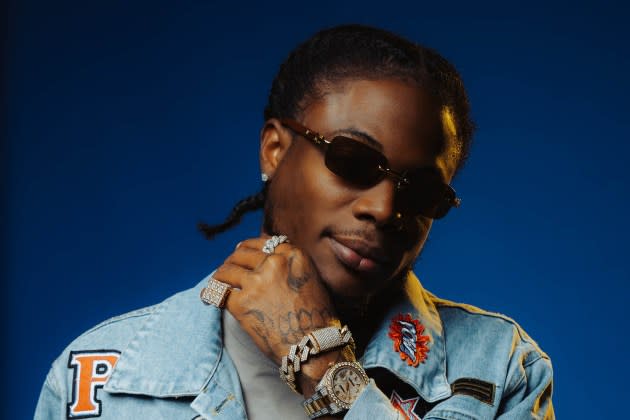Masicka Has Big Dreams for Dancehall’s Future
- Oops!Something went wrong.Please try again later.
- Oops!Something went wrong.Please try again later.

The first sign that Masicka doesn’t stick to any preconceived path arrives when the new-generation Jamaican dancehall artist talks about some of his favorite musicians, like Bob Marley, Shabba Ranks — and Lukas Graham, the sensitive Danish pop band that scored a string of hits in the 2010s? “I like artists who sing from their souls, and Lukas is one of those who have a different reproach,” Masicka says. “You might think, ‘Oh, it’s just lovey-dovey,’ but I’m hearing words I can connect to.” And don’t get him started on Kenny Rogers’ “The Gambler,” which he heard long ago by way of his grandmom (Rogers is very popular in Jamaica).
Masicka has been performing and making records in his home country for more than 15 years. But as revealed by that playlist, he hasn’t been afraid to tug at the boundaries of dancehall by incorporating elements of genres like hardcore hip-hop and modern quiet-storm R&B. His second album, last year’s 17-track Generation of Kings, continues that mission on an even grander scale by blending in Afrobeats (“Fight for Us,” with Nigerian artist Fave) and more R&B (“Wet,” featuring Haitian balladeer Fridayy). “I was working off more experiences, wanting to venture into different songs and trying to be different while keeping my identity,” the 31-year-old says, pointing to other Jamaican artists who have successfully expanded their range. “We see Bob Marley do it and Shabba Ranks. So it has been done before.”
More from Rolling Stone
Hong Kong Boy Band Mirror Have 12 Members and One Big Goal: Taking Cantopop Worldwide
Veeze's Greatness Speaks for Itself - One Croaky Bar at a Time
The intermingling of styles shouldn’t come as a surprise. As a kid in Portmore, in the southeast of Jamaica, the artist born Javaun Fearon grew up on Eminem, 2Pac, and 50 Cent as much as on classic dancehall by Bounty Hunter and Sean Paul. 50 Cent actually inspired Fearon’s stage name after an aunt lent him a portable CD player and a copy of 2005’s The Massacre. “When 50 Cent came out, that’s when I knew I’m going to be an artist,” Masicka says. “The whole G Unit with him and Young Buck, it was a whole movement and turned up the whole vibe. 50 Cent reminded me of a dancehall artist. He’s proud of what he’s doing and not ashamed to be himself.”
After winning a few contests with his live performances, Masicka moved into making his own records and found his voice with 2012’s “Guh Haad and Done,” a street-survival epic that set his spitfire delivery to a blend of dancehall and electronica. “After I did that song, I knew I had something in me,” he says. “I knew I could do something different.” His vocabulary expanded further with singles like 2018’s “They Don’t Know,” which mixed in luxurious R&B vocals, culminating in the multi-genre Generation of Kings.
Up next: a summer U.S. tour with his most elaborate stage set. “I think you should not box in yourself to do one thing,” he says. “If you love cars, you’re not only going to have a Toyota. You would love to drive a Ferrari or Porsche [or] Lamborghini.”
Best of Rolling Stone